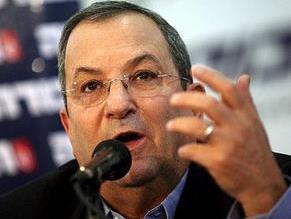|
World Jewish News

Israel's Defence Minister Ehud Barak : “As far as we know it [the intelligence assessment] brings the American assessment much closer to ours... it makes the Iranian issue even more urgent and [shows it is] less clear and certain that we will know ev
|
Talk of Iran strike dominates Israeli press
10.08.2012, Israel and the World Talk of a possible military strike on Iran's nuclear Facilities dominated the Israeli press on Friday, as Defence Minister Ehud Barak said that a recently disseminated US intelligence report is closer than ever to Israel’s own intelligence estimates on Iran.
"(Prime Minister Benjamin) Netanyahu and Barak are determined to attack in Iran in the autumn," trumpeted a front-page headline in top-selling daily Yediot Aharonot.
According to Nahum Barnea and Shimon Shiffer, two of the paper's most senior writers, if Netanyahu and Barak were to decide on their own, they would likely order an attack on Iran's nuclear facilities "in the coming months of autumn, before the US elections."
"There is immense significance to the fact that these two senior figures, the Prime Minister and Defence minister, are determined to take the decision," they wrote.
"It is no less significant that not one senior official in the establishment -- not in the military, nor in defence establishment, nor even the President (Shimon Peres) -- currently supports an Israeli attack."
The Haaretz newspaper led its weekend edition with an unnamed Israeli official warning that Israel was currently in greater danger than before the 1967 Middle East war.
"The sword at our throat now is sharper than the sword at our throat before the Six Day War," the official told Haaretz, stressing that despite US commitments to prevent a nuclear Iran, "Israel must responsibly ask itself what a lack of action now would mean."
And the Maariv newspaper's front page highlighted an opinion poll which found that 37 percent of Israelis believe a nuclear Iran could lead to "a second Holocaust."
Netanyahu has warned that weapons of mass destruction in the hands of "Iran's ayatollah's" could lead to "another genocide," and President Shimon Peres said that Iran's President Mahmoud Ahmadinejad was "threatening a new Shoah," the Hebrew word for Holocaust.
Israel says Iran's nuclear programme poses an existential threat, and has repeatedly refused to rule out military action to halt Tehran's nuclear activity.
Just three months before US President Barack Obama seeks a second term, his administration is loath to launch a new US war in the Middle East and wants to give time for newly strengthened sanctions to work.
Iran refuses to bow to Western demands that it curb its sensitive uranium enrichment under the pressure of punishing economic sanctions that were ramped up in July to their toughest level so far.
A series of visits by high-ranking US defence officials to Israel has raised speculation that Washington is trying to dissuade Israel from a preemptive military attack.
In a Thursday interview, Barak said that a recent US intelligence is closer than ever to Israel’s own intelligence estimates on Iran. The latest US estimate, he told Israel Radio, gives much more urgency to stopping Iranian nuclear proliferation.
“As far as we know it [the intelligence assessment] brings the American assessment much closer to ours... it makes the Iranian issue even more urgent and [shows it is] less clear and certain that we will know everything in time about their steady progress toward military nuclear capability,” Barak said.
“We and the Americans agreed not to allow Iran to develop nuclear weapons and all options are on the table,” Barak said.
Ultimately, however, it is the Israeli government that will make decisions regarding its security and future, he added.
Regarding the differences between Israel and Washington, "the discourse is much less black-and-white than what is thought," he said.
He also said that a decision on a military strike on Iran's nuclear facilities would necessitate a vote in the Israeli government, which currently has 29 members.
"The image created in the public realm, as if two men sit and conjure fantasies or reach decisions on their own is absolute malarkey," Barak said. "Only the government can decide on such issues."
Earlier in the week, Israeli Prime Minister Binyamin Netanyahu once again shot down the idea that a nuclear-armed Iran could be contained. “If Iran gets a nuclear bomb, it may actually use it,” he said in a meeting with visiting Australian Foreign Minister Bob Carr.
That the Iranians might actually use the bomb is a reality that cannot be denied, Netanyahu, was quoted as saying by The Jerusalem Post.
“This is a regime that has broken every rule in the book,” he added. “They very likely could use weapons of mass death.”
Netanyahu said there was an illusion among many in the world that if Iran acquired nuclear weapons, it would behave responsibly like the world’s other nuclear states.
Netanyahu said Iran is governed by a “fanatical regime” that sees itself on a sacred mission of global Islamic domination, and destroying Israel was just one step toward its larger vision.
“Everyone talks about the cost of stopping Iran, “but they shouldn’t ignore the cost of not stopping Iran,” he said.
Netanyahu’s comments came a week after he said the country’s elected political leadership, and not the defense and security establishment, would make the decision to attack Iran.
Those remarks followed media reports of Israel’s top security officials opposing an Israeli attack without US backing.
EJP
|
|
